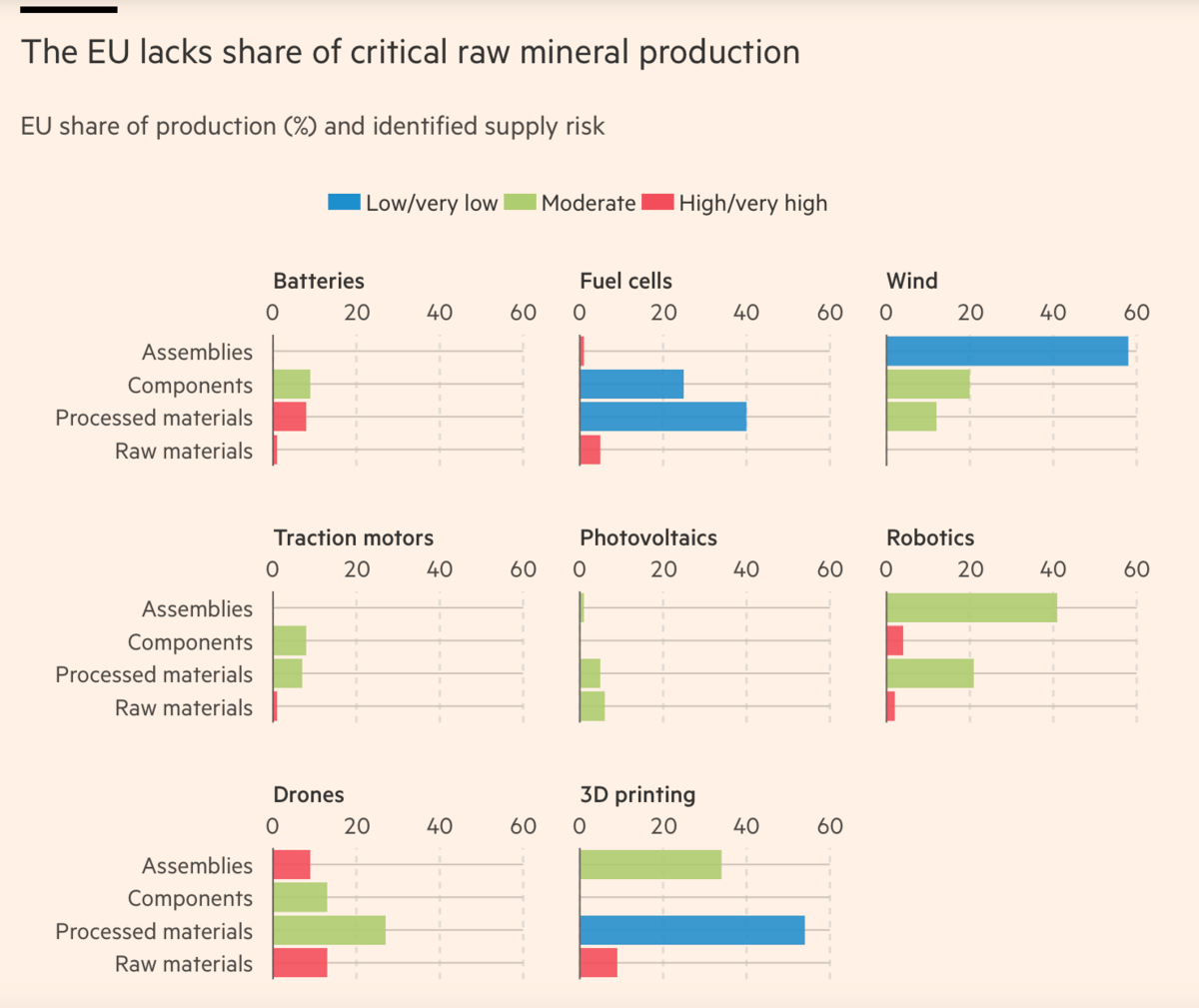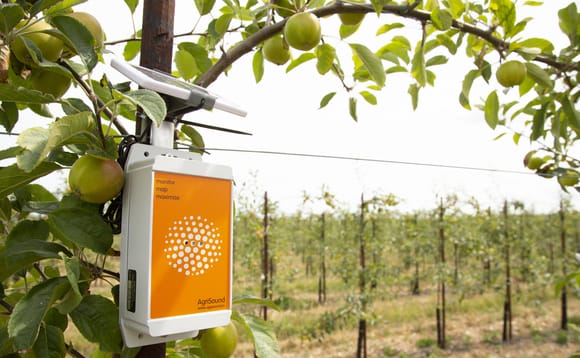Happy Tuesday. We want your feedback on the new look of our email - drop us a reply and let us know what you think.
In today’s edition:
🐝 M&S are giving bees a voice
🗑 EU's act to secure metals for Net-Zero
💰 The latest in climate tech funding
Forwarded on this email by a friend?
💼 Big Business (1-minute read)
EU to dig for the green energy transition
The European Union is planning to lower regulatory barriers surrounding the mining of raw materials for wind turbines, solar panels and electric vehicles (lithium, cobalt and graphite) .
Why? By 2050, EU demand for lithium will grow by x60, and demand for cobalt and graphite by x15. The EU is currently heavily dependent on imports (Europe produces <1% of global lithium).
The details: The allocation of mining rights for these mines has historically been protestested, and surrounded by substantial regulation. Among the ideas for the Raw Materials Act are provisions to designate key strategic projects for accelerated regulatory / legal authorisations.
Our take: The transition to a net-zero economy will be metal-intensive. Innovation for circular/recycling innovation is critical but not currently at scales required. Governments should look to send clear demand signals to secure raw-material supply from current mines - focussing on mines making efforts to minimise environmental impact (A tricky balance!)

After Signing Climate Bill, Biden Prepares More Actions to Cut Emissions
What’s happened: Fresh off signing expansive climate legislation, The Biden administration is planning a series of executive actions (See here) to further reduce greenhouse gas emissions.
Target areas: Power plant emissions, Curbing methane and vehicle exhaust pipes
Importance? The Biden administration's plan is a 50-52% cut in greenhouse gas emissions by 2030, dropping to net zero by 2050. Consensus is that the Inflation Reduction Act gets the US to ~40%. Further executive actions will help close the gap and make up for compromises that helped get the IRA passed - agreeing to some fossil fuel and drilling provisions.
Watch out: Unlike legislation, executive actions can be easily undone by a future administrations (Trump rolled back more than 100 of Obama’s environmental regulations)
Carbon-Tech Draws Record Venture Funding as Investors Hunt for Impact
Climate startups have attracted record investments at a time when other industries are struggling to tap funds from venture capitalists. A record $1.4 billion poured into climate-focused startups in the second quarter of this year - a stark contrast to the broader market for venture funding.
Why? Bullishness around a rise in sweeping funding from government policies like the US Inflation Reduction Act ($100 bn to carbon capture projects in tax credits) AND… could it be that VC’s are increasingly considering impact alongside ROI?
🤖 Future of Tech (1-minute read)
Giving bees a boost on UK farms
UK supermarket Marks & Spencer has partnered with agri-tech startup AgriSound to track farmland pollinators, boost crop yields and enhance biodiversity. Trial farms will have in-field acoustic sensors capable of monitoring the density of key pollinators (e.g. bumblebees, honeybees and other insects). The system will highlight low areas of pollinator activity and suggest simple interventions farmers can take (e.g. planting wildflower meadows in a nearby field). Good for pollinators = Good for crop yield and fruit quality = Good for farmers
The importance? Without pollinators - bees, butterflies, moths, and other bugs, we would lose more than 70% of all food crops. The UK has lost 13 species of bee since 1900, with more at risk of extinction - this tech could help to halt the bee decline.

De-extinction company sets its next (first?) target: The thylacine
A start-up Colossal, which has already said it wants to bring the mammoth back from extinction, has said it will first target de-extincting (We promise it’s a word) the Tasmanian Tiger
Climate angle… De-extinction is the resurrection of an extinct species using gene editing. The mammoth has been touted by some for its potential to slow permafrost thawing. When living, the giants would knock down trees in the Siberian tundra, leave droppings that fertilised the soil, and compact snow - all of which, proponents claim, lessened permafrost thawing.
The cold water: Nothing about this project will be easy - even if the team can overcome the technical challenges of gene editing, reintroduction of species into landscapes has a sticky history of unintended consequences. The big picture: Even if Colossal never gets a woolly mammoth on the ground, the project could help advance gene-editing tech with tangible climate benefits (improving genetic diversity in species close to extinction)
💡 Deep Dive (1-minute read)
Digital technology can reduce global emissions
Analysis by The World Economic Forum (WEF) shows digital technologies could reduce greenhouse gas (GHG) emissions by 20% by 2050 across the 3 highest emitting sectors: energy, materials and mobility.
Digital technologies include…
Decision-making technologies (i.e., Artificial Intelligence/AI)
Sensing and control technologies that collect data (i.e., Internet of Things (IoT) sensors)
Enabling technologies (i.e., Cloud computing)
Foundational technology (i.e., Big data and analytics)
How can digital tech reduce emission?
1. Energy: Enhancing energy efficiency of buildings and increasing the efficiency of renewable energy deployment can deliver an estimated 8% emissions reduction. Schneider Electric’s IntentCity building is equipped with IoT technology which captures over 60,000 pieces of data to constantly adjust the building's conditions to maximise efficiency.
2. Materials: Digital tech can provide up to 7% GHG reduction. - IoT tech allows real-time energy consumption monitoring to help identify energy-saving initiatives across manufacturing processes. Adopting 3D printing tech allows customised designs and production for resource and waste reduction.
3. Mobility: GHG emissions could be decreased by 5%. Mobility-as-a-Service (MaaS) platforms (i.e., Uber) are becoming advanced mobility planning tools for consumers, encouraging a full range of lower-carbon options like eBikes. Uber has added non-rideshare options to its customer app, which uses analytics to recommend transportation solutions.
Impact at scale? A recent study shows that companies still prioritise the economic opportunities of digital tech over environmental and social gains. To scale impact organisations must…
Prioritise: Digital inclusion and development of green tech skills in their workforces
Foster: collaboration among digital, sustainability and operations teams within their business
Partner: with private companies, start-ups, technology providers, investors and public agencies to form ecosystems with sufficient innovation, funding and regulatory support

💭 Little Bytes
Quote: “Energy system transformation is critical to reaching the Paris Agreement warming limit.” Dr Robert Brecha, the co-lead of a study, has branded the scenarios offered by oil and energy giants to decarbonise as “incompatible” with the 1.5C target of the Paris Agreement
Stat: Extreme heat belt to place 100mn Americans at risk in 3 decades - First Street Foundation
Watch: A Dutch town using bubbles to trap plastic rubbish in rivers
💰 Deal room…
Direct-C Closed a $3.9 Million Series A To Scale Oil their Leak Detection Tech
SunGreenH2 closed £2 million Seed round for its Modular green hydrogen generation device that uses only sunlight and water to produce zero emissions hydrogen
BioAg completed a $18 million Series B round to decarbonise mainstream agriculture using mycorrhizal fungi to sequester carbon
Sea6 Energy completed a $18.5 million Series-B for its seaweed farming tech for use in sustainable fish feed and biofuels
🗞 In other news…
Pandora launches lab-created diamonds using 100% renewable energy
UK startup has raised £3.5mn to develop a vinyl record production process that eliminates the use of harmful chemicals and drives down emissions.
New Robo-taxi service officially launches for public use in Las Vegas run by Lyft as a prelude to a fully driverless service that is set to launch in 2023.
Ben & Jerry’s to crack down on human rights abuses in cocoa supply chain through tie-up with Tony’s Chocoloney
